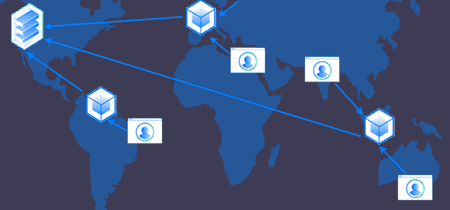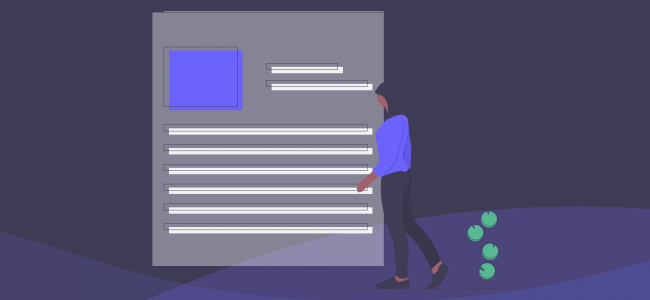I’ve already answered the common question “What is a content delivery network?” so we’re just going to jump right into it. If you aren’t exactly sure what a CDN is or what it’s used for, I recommend brushing up on that first.
If you want to skip ahead and get right into the benefits of content delivery networks, it’s pretty self-explanatory so you should receive a good understanding of what they’re for just based on what you’re about to read. Let’s waste no time.
[displayAd]
The 4 Benefits of a Content Delivery Network
There are other more specific benefits which I’ll touch on only incidentally since they’re much more technologically complex, but here are the more important and significant positives along with the major reasons that people will use these CDNs.
Server Load Times
The main reason to use a CDN is to improve the load times of your website. If your site is taking many seconds to load, you’re losing a significant amount of your potential visitors. Whether you’re paying for traffic or working to get visitors via organic search (through search engines), losing 10% to 25% of your audience due to a slow-loading site is catastrophic.
Imagine running a retail store and 1 out of every 4 people who decide they want to enter your store, randomly get locked out for an undetermined amount of time, only being allowed to enter after 5 seconds. It’s simply unacceptable. Slow loading times will affect your conversion rates too, even for those patient enough to stick around.
Beyond that, a faster site will perform better in advertising metrics which can help you pay less for your traffic due to higher quality scores, and can even help your website to rank higher in search results due to providing a better user experience.

The way these faster page load times are achieved is that your files are cached and sent to servers around the world in key, strategic locations. In this way, a user in the USA won’t have to wait on your files to cross the ocean from the UK. They’ll receive the files from a much faster server than your web host provides from a server in the USA near where they live.
Lower Cost
A CDN can save you money on bandwidth by transferring your site’s files to your user much more efficiently, including the use of caching, which is another key benefit of using a CDN. This means you won’t be paying your regular web host for tons of extra CPU power, RAM memory, and bandwidth.
Caching means your site doesn’t have to run calculations and calls to the database every time a page is loaded, it does it once and then serves up the cached version to your visitors based on how you decide to configure it. The caching itself isn’t the benefit per se, but it’s the feature that enables a handful of different benefits.
[displayAd]
Handling Virality
If your site gets mentioned on a popular podcast, or even a local blog, the sudden influx of traffic can easily be enough to take many sites offline, especially if you’re using a basic hosting plan that isn’t meant to scale. The CDN gives you a certain amount of scaleability that you wouldn’t otherwise have.
To further touch on the lower cost you achieve by running a CDN, even if your host can handle the surge of traffic, sometimes you’ll end up paying a small fortune in bandwidth over-usage which may or may not even be worth it, depending on what type of site you have. For a commercial site, the extra exposure should more than cover the costs, but for a hobbyist site, this extra bandwidth from your host could be enough to end the project.
A CDN can act as a bit of an insurance policy, just in case things get out of hand in a good way. And that’s just talking about legitimate visitors, let’s get into malicious intent now…
Security
Websites get hacked and attacked on a daily basis, it’s not uncommon at all, so taking the most basic precautions to protect your home on the web is an absolute necessary, and this includes using a CDN.
Most content delivery networks will offer some form of DDoS protection, so if someone is intentionally trying to take your site offline (rather than your site going viral with real users), there’s no upside there at all – it’s just expensive, and it stops real people from being able to access your site at all.
The best CDN providers offer DDoS attack protection, sometimes included at a basic level, and other times for an additional fee. At the cheap tiers they’ll filter all traffic though at your expense and loading time so they can offer it to the higher tiers without that time delay, so please pay attention before ordering. Cloudflare does this and I do not recommend using them at any lower tier offering, at all. It defeats the purpose.
A CDN can also protect your site from potential hackings by filtering out dangerous traffic or unnatural attempts at accessing your site. It’s not a full-stop solution to site security, but it’s a key role as part of a larger plan.
It’s no fun having to think about people going out of their way to try to damage your website, but it happens, either by random attack or being directly targeted. A CDN is a great first step in preventing these random attacks from causing any harm, and it also helps slow down targeted attacks against your online properties. The main goal is to make it inconvenient to attack you so they move on to other easier targets.
[displayAd]
Final Thoughts & Considerations
At the end of the day, the benefits of content delivery networks far outweigh the miniscule cost or amount of effort that it takes to integrate them into your websites.
There aren’t very many examples of websites, in particular business sites, that wouldn’t benefit greatly from using a CDN. It is an added cost but one that pays dividends as you begin to attract a lot of interested traffic.
